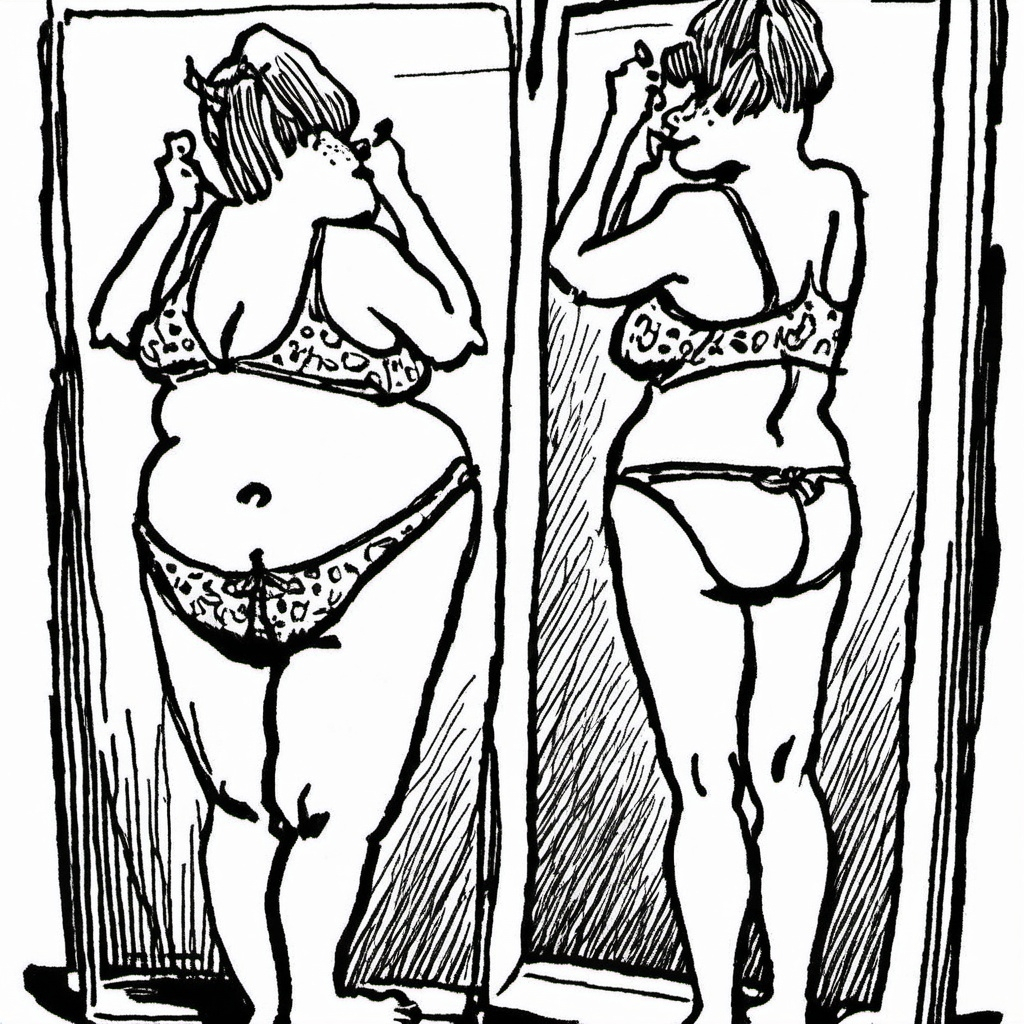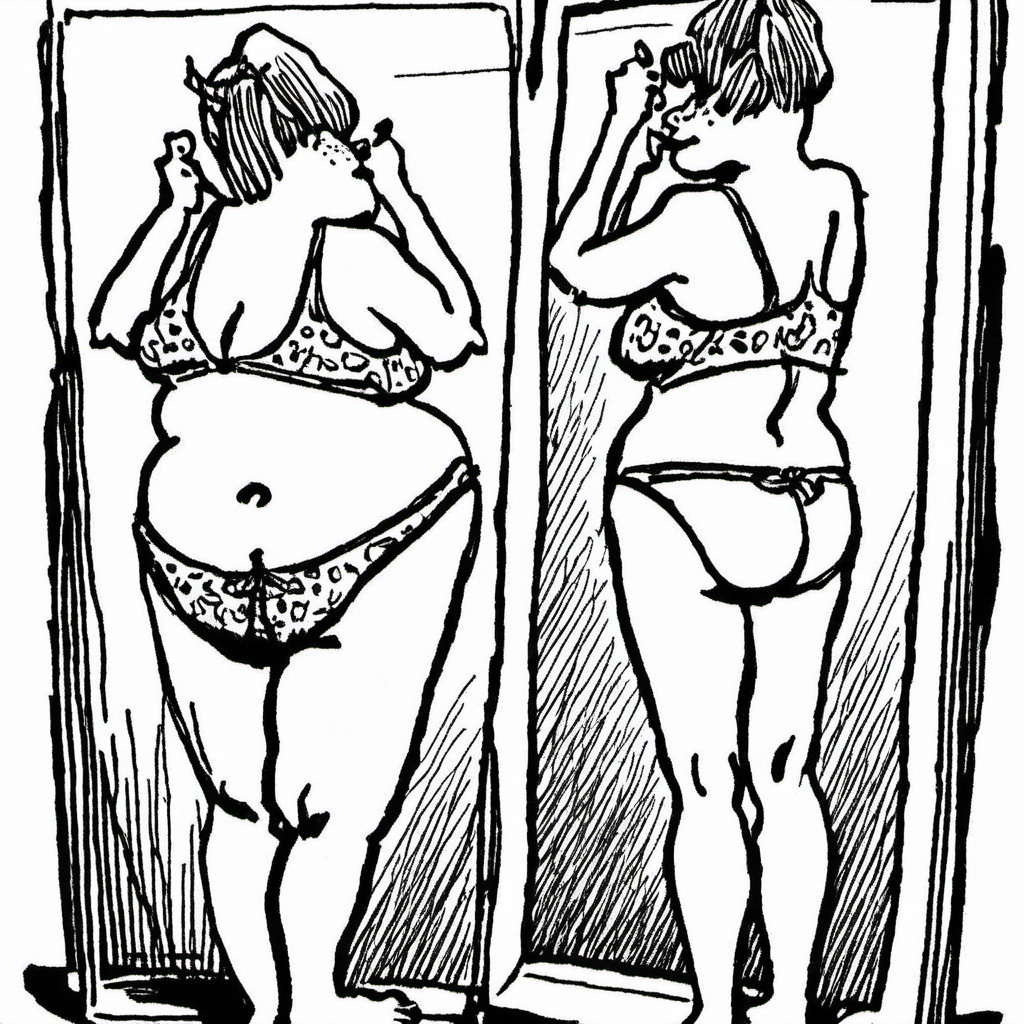- Home
- Body Dysmorphic Disorder
What is Body Dysmorphic Disorder?
When Your Reflection Doesn’t Match Reality
What is Body Dysmorphic Disorder? Now... that's an interesting term! So, what is it?
Have you ever looked in the mirror and felt like what you saw didn’t quite match what others see? Maybe you’ve lost weight but still feel “big,” or perhaps you’ve gained weight but see yourself as slim as always. If so, you’re not alone. This experience is called body image distortion, and for some, it can become a mental health condition known as body dysmorphia.
Let’s break down what these terms mean, why they happen, and how you can start to heal your relationship with your body.
What Is Body Dysmorphia?
Body dysmorphia, or body dysmorphic disorder (BDD), is when someone becomes intensely preoccupied with perceived flaws in their appearance. Flaws that are often invisible or trivial to others. This isn’t just about vanity or wanting to look better; it’s a mental health issue that can deeply affect a person’s happiness, confidence, and daily life.
People with BDD often see themselves in a way that doesn’t match reality. They might spend hours worrying about their looks, avoid social situations, or even undergo unnecessary cosmetic procedures. It’s not just about what’s in the mirror—it’s about what’s happening in the mind.
Why
Do People See Their Bodies Differently
Than They Really Are?

The Case of “Phantom Fat”
Imagine Sarah, who spent most of her adult life severely overweight. After more than a year of hard work, she lost over 90 pounds. Her friends and family cheered her on, and her doctor was thrilled.
But when Sarah looked in the mirror, she still saw her old self. Even after losing all that body fat, Sarah would go through the motion of squeezing through doorways sideways. She'd avoid tight spaces, and worry about breaking chairs when she sat down! No matter what, she couldn’t shake the feeling that she was still very “big.”
This is known as "phantom fat" and here’s why it happens:
- Old Habits Die Hard: If you’ve been a certain size for years, your brain gets used to it. Even after losing weight, your mind may still picture your old body.
- Emotional Lag: Feelings of anxiety or low self-esteem can keep you stuck in the past, making it hard for your brain to “update” your self-image.
- Behavioral Patterns: You might keep acting like your old self—avoiding crowds, making self-deprecating jokes—because that’s what feels familiar.
Seeing Yourself as Slimmer Than You Are
On the flip side, some people gain weight slowly and still see themselves as slim. This often happens because of:
- Social Comparison: If your friends or family are also heavier, you might feel “normal” by comparison.
- Memory Bias: Your mind clings to memories of being thinner, even as your body changes.
- Gradual Change: Slow weight gain can sneak up on you, making it easy to overlook the difference.
The Consequences of Body Image Distortion
Body dysmorphia and distorted body image aren’t just about appearance—they can have serious effects on your emotional, social, and physical well-being.
Emotional and Mental Health
- Anxiety, depression, and low self-esteem are common.
- People may obsess over their looks, leading to hopelessness or even thoughts of self-harm.
Social Impact
- Avoiding social situations out of fear of judgment.
- Difficulty accepting compliments or connecting with others.
Behavioral Consequences
- Compulsive mirror-checking, seeking reassurance, or comparing yourself to others.
- Extreme dieting, over-exercising, or unnecessary cosmetic procedures.
Physical Health Risks
- Underestimating your size may lead to ignoring health risks.
- Overestimating your size can result in dangerous dieting or eating disorders.
How Is Body Dysmorphia Treated?
The good news? Help is available, and recovery is possible.
Cognitive-Behavioral Therapy (CBT)
CBT is a type of talk therapy that helps you challenge negative thoughts about your appearance and replace them with healthier, more realistic ones. It also addresses unhelpful behaviors, like constant mirror-checking.
Support Groups and Family Involvement
Connecting with others who understand what you’re going through can be incredibly healing. Support groups and family therapy can provide encouragement and practical strategies.
Medication
Sometimes, doctors prescribe medications like SSRIs (a type of antidepressant) to help manage anxiety and obsessive thoughts.
Healthy Coping Strategies
- Focus on your strengths and what your body can do, not just how it looks.
- Build a support network—don’t be afraid to reach out for help.
- Practice self-compassion and mindfulness. Notice when you’re being hard on yourself, and gently challenge those negative thoughts.
What is Body Dysmorphic Disorder? My Final Thoughts
Anyone can struggle with body dysmorphia or body image distortion, no matter their size or shape. These issues are about so much more than what’s on the outside, they’re shaped by deep psychological and social factors.
Remember, changing your body doesn’t always change your mind. Healing takes time, support, and sometimes professional help.
Like Sarah, you may need time for your mind to catch up with your body. But with patience and the right support, you can learn to see yourself with kinder, more accurate eyes... and enjoy life to the fullest.
If you or someone you love is struggling with body image, reach out. You’re not alone, and help is available.
Use my contact form and I will help you find the support you need.






New! Comments
What do you think about what you have read on this page? I'd love to know! Leave me a comment in the box below.